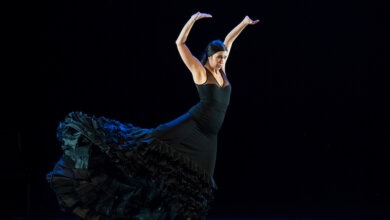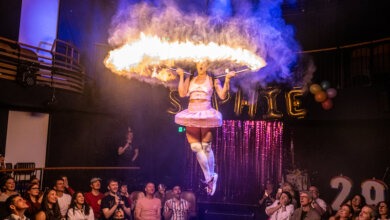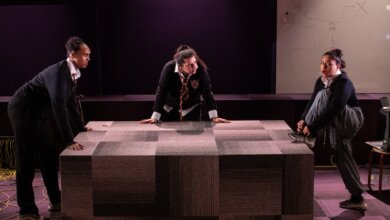Writers: James Graham
Director: Jeremy Herrin
When Best of Enemies opened at the Young Vic almost a year ago it was clear a West End transfer was in its future and now it’s here, the show seems destined for Broadway. A fight for the “soul of America”, James Graham’s play comments on the changing face of television news, the growth of opinion-focused performance in place of factual reporting and the aggressive nature of uncivilised debate. It is even sharper than it was last year.
It is 1968 and ABC news is trailing behind its competitors when the decision to provide “unconventional convention coverage” changes the face of television news forever. The instrument of their success is a series of fiery debates between rival political positions championed by conservative commentator William F. Buckley Jr and liberal celebrity playwright Gore Vidal. But as the events take shape, a consuming personal dislike between the debaters explodes and everything changes.
Beautifully structured as ever, Graham’s play principally divides into two settings, the Republican Convention in the first half and then Democratic Convention in the second, across which excerpts of the televised debates are enacted. But the scope of Best of Enemies is considerably more expansive, exploring not only the views, preparation styles and personal lives of Buckley and Vidal as they try to anticipate and best one another, but also the context in which these debates came about both within ABC itself and more broadly in the turning point year of 1968.
Graham’s work often looks at how these moments of change create, often subtle, shifts in political discourses that have had significant consequences for contemporary society, particularly when these are facilitated or shaped by television. Here Graham creates a sense of the debates as both the culmination of long-running issues in American society and the beginning of a new kind of interaction that has emerged from Buckley and Vidal’s acrimonious exchanges. In pin-pointing that moment with such forensic care, Graham is nonetheless able to marshal a host of fascinating contextual factors from the war in Vietnam, student protests and campaigns for social justice to a series of high-profile assassinations, Vidal’s connection to the Kennedy brothers and the ratings-chasing populism developing in TV news. Best of Enemies isn’t just what happened but why, how and what it all means.
Bunny Christie’s set design feels more compacted than it did in the Young Vic and looks magnificent as a result, playing at multiple levels on the stage that allows director Jeremy Herrin to elegantly manage scenes taking place simultaneously in the control room and on the Studio Floor – and while Graham has extracted dialogue from the debates, there is considerable craft in the various ways in which these are presented. All of this is enhanced by Max Spielbichler’s superb video design, projecting original news and other footage onto three sides of the stage as well as relaying the interaction of the protagonists.
Reprising his role as Buckley, David Harewood is on tremendous form in a part he seems to relish, and you can feel the audience responding to the performance. His Buckley is incredibly charismatic and determined to be dignified but Harewood charts the early setbacks, Buckley’s renewed vigour in Chicago and the breakdown of civility well. The debates themselves are pacey and there is a biting chemistry with Zachary Quinto’s Vidal that becomes nicely tetchy and eventually explosive. Quinto too finds humanity under the performative layers that Vidal shows to the world with even hints of a desperation for political respect below the surface, although very occasionally the impersonation of Vidal gets in the way of Graham’s scrupulously balanced text and its crunchy intellectual discussion.
This small series of debates between Buckley and Vidal “shouldn’t have mattered” but now they do, and Best of Enemies has much to say about how this moment changed the nature of public argument. But perhaps its most revealing comment is on the different between professional talkers and those who act, mirrored in the ways that television news shifted from reporting the conversation to leading it.
Runs until 18 February 2022





